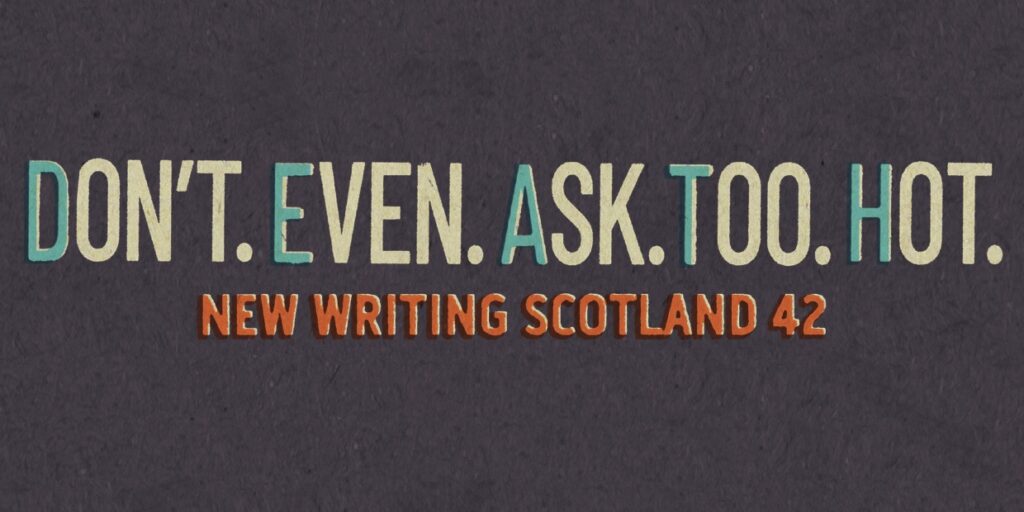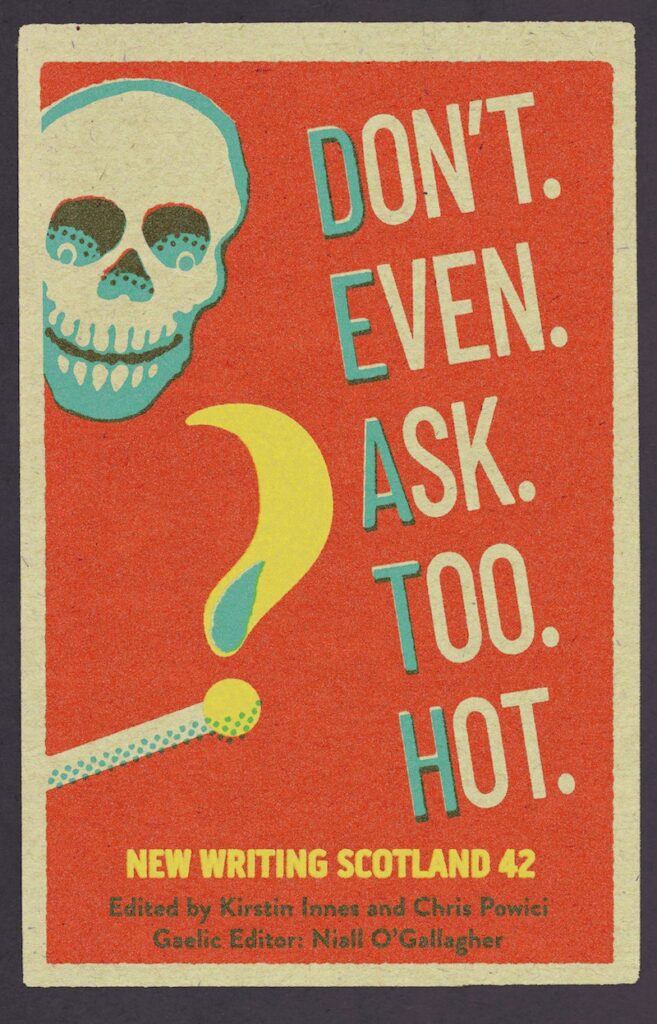
Our editors Kirstin Innes and Chris Powici introduce New Writing Scotland 42:
There was a sense, building over the months as we read through the over seven hundred anonymised submissions that made up this year’s New Writing Scotland entries, of the stakes getting higher. Perhaps the way we live now – so publicly, so very much in and around each other’s business, so hyper-aware of the world – demands this sort of focus from writers. There is a definite intensity to the writing submitted by this year’s cohort. When taken out of context, our chosen title, Don’t. Even. Ask. Too. Hot., is not subtle, but then these are not really subtle times.
The outbreak of the Israel/Gaza war happened too close to the NWS submission deadline for the writing in this edition to reflect Scottish perspectives on the continuing tragedy of that conflict, but of course this world isn’t short of other rocks and hard places for writers to get between. The shadow of climate change and degradation of the natural world hangs over many of these pieces. Nor have the contributors to this issue shirked from showing how the abstractions of politics and economics mean real-life hardship for flesh-and-blood women, men and children. As Shasta Hanif Ali’s ‘How to get eggs off your windows (following a racist incident)’ describes, simply getting through another day with your humanity intact can be a question of practical, determined resistance.
It’s also been invigorating to witness how some of the writers in this collection approach these weighty, real-world subjects creatively, teasing and probing at the presumed limits of realism in fiction or narrative non-fiction. Ania Zolkiewska’s ‘Shrapnel from Kharkiv’ presents fragments from the ongoing war in Ukraine, refracted through a choose-your-own-adventure-style looping nightmare; Catherine Wilson Garry’s ‘Besom’ uses scifi tropes of timeloops and multiverses to build slowly dawning horror in a contemporary story of patriarchal control in a heterosexual relationship.
No, the times are not subtle. But the many, varied ways the writers in this book approach them are, and with that subtlety comes space for tenderness, gentleness and the tiny moments of everyday interaction that make us human.
Let’s go back to the quote we chose for the cover, and fill in some context around it. It comes from Ioulia Kolovou’s beautiful, genre-defying piece ‘[A Bilingual Dictionary of Loss & Mourning Weaved With Fragments from a Journal]’ which attempts to make linguistic and geographical sense out of an immigrant’s two experiences of grief in different countries.
‘It still surprises me how much we people, we poor people, we poor wee people, whippoorwills, how we fear death and its apparatus and its very name,’ observes the narrator. ‘Don’t. Even. Ask. Too. Hot.’
Here is writing that is not afraid to get up close, to name the things that scare us, but that also reawakens us to the grace of love, the call of place and community, the thrill of music, the consolation of art, and, not least, the presence, despite everything, of the marvellous. Poetry as an act of remembrance – whether uncertain and fearful, or recuperative and sustaining – finds vital expression throughout this issue, including work by Rachel Clive, Zoë Green and Lynn Valentine. Colin Bramwell’s ‘Devotional Music’ takes us on a journey of musical and spiritual revelation.
And, of course, the question of what it means to be Scottish, almost a quarter of the way through this strange and troubling century, is inescapable. Thankfully – wonderfully – it’s a question that’s been met with a plethora of answers, that blend passion, humour, cussedness, honesty, realism and hope in generous measure. A sense of Scotland overflowing its topographical borders in a spark-flying encounter with the wider world energises Benjamin K. Herrington’s exuberant and daring ‘Yo’ Momma’, while the late Lorna J. Waite holds the cosmological and the parochial in a fine embrace. As she puts it in ‘Wee Mercury’: ‘Like tartan, we are all the one stuff’.
